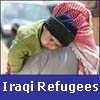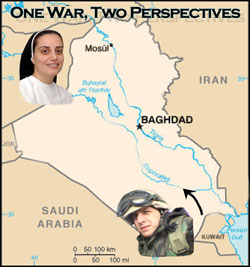 |
One War, Two Perspectives
Q: Where were you on March 19, 2003 when the US began its invasion of Iraq? A: (Nathan) – “I began the day at Camp Fox in Kuwait. It
was around midnight when I arrived. I got my bags and was assigned
a bunk in the officer’s tent. That morning I ate breakfast
with some Army guys and watched Fox News. It was there that
I saw that the invasion had begun. After that I was supposed
to go to a meeting but we had a bomb scare so I ended up in the
bunkers instead. Later that day I went to the Hilton Hotel
in Kuwait City to receive press credentials and later I hitched
a ride in a humvee. I got dropped off at Camp 93 somewhere
very near to the Iraqi border. It was three days later on
March 22 at 3:45 in the morning that I left Kuwait with Naval Mobile
Construction Battalion 133 (NMCB 133) and entered Iraq.” Q: What were your feelings during the initial days of the invasion? A: (Ban) – “We were expecting something bigger. We were afraid the war would create chaos. It’s sort of like what Iraq is experiencing today, being out of control. I was very concerned about my father and brother who were in Baghdad. I do not remember the date correctly, but there’s one night early on in the war I will never forget. All the local members of the Ba’th Party (Saddam’s Socialist Revolutionary Party) were sent to different schools to create security check points and one of the schools was across from the house I was staying at in Karakosh. I was very scared that night because I thought we might get bombed. That night our brother-in-law said we had to leave the house because it was very dangerous. We were all crying and we didn’t know what was happening. I remember the children were screaming and crying. We didn’t know what was going to happen. We were up all night, we had no idea.” A: (Nathan) – “I was a little tense but not nervous. There’s a unique feeling that I experienced being on enemy soil. It was an eerie feeling like I just wasn’t supposed to be there I felt like an uninvited guest. However, I had full confidence that the Seabees and Marines who were assigned to protect the battalion would guard my safety or my life.” Q: How did the Iraqi people feel about US troops during the initial invasion? A: (Ban) – “Most of the people were really happy and they were expecting freedom. They were welcoming the US by clapping and they used different gestures and noises to express their happiness. We were expecting a lot of changes, but what we got was the opposite of what we expected.” A: (Nathan) – “I saw nothing but scenes of gratitude. As I traveled through the southern part of the country, Iraqi civilians came to the streets to wave to the troops, smile and give thumbs up. I’m sorry to say, I don’t think those people share those same feelings anymore.” Q: What was your impression of the American military soldiers who were invading Iraq? A: (Ban) – “I did not know what to expect from the Americans. At that time I was just numb.” A: (Nathan) - “It was a group of young American men, similar to me, along with a handful of women. All seemed determined to do their job for their country and come home safe and sound.” Q: What do you believe was the American soldier’s impression or perception of the Iraqi people? A: (Nathan) – “I noticed that the Seabees’ impression of Iraqi citizens changed as the battalion traveled the countryside. It was then that I believe the Seabees recognized that this was an oppressed group of individuals who were far from enjoying the freedoms, liberties and advantages that come along with living in the United States. I think at that point it made the mission a lot more clear and worthwhile. These men, and four women, felt proud to be helping people escape hardship, cruelty and domination.” A: (Ban) – “”It’s hard to tell, but what I have to say is if they were really coming to give us freedom, why would they go first to the banks and break the locks and allow people to go to the schools and museums to loot? If they really came to give us freedom why would they let this happen?” It was totally chaotic when all the government buildings were open and unguarded.” Q: How have things changed in Iraq since the time of the invasion? A: (Ban) – “What really is different is more car bombs and more dying, kidnapping, and beheadings. For so long we didn’t have all these things under Saddam Hussein. There was really nothing like this under Saddam. I used to be in the Baghdad streets at 10pm or stay out with my family until 5 o’clock in the morning socializing or having dinner, eating ice cream and enjoying time with friends. Now, everyday we have a curfew. You won’t see anybody on the streets. It’s not the same as before.” A: (Nathan) – “I only know what I’ve seen on TV, read from news reports and discussed with Dominican Sisters and Brothers. I feel for those who are living in terror. I can’t image what it would be like to have to flee your home because of violence and uncertainty.” Q: In your opinion what is the real reason the United States went to and still are in Iraq? A: (Ban) – “It was for their own benefit.” A: (Nathan) – “I’m not sure why the US went to war with Iraq.” Q: What can the United States today do to improve the current conditions in Iraq? A: (Nathan) – “Turn the electricity back on! The US should do whatever it takes to help the Iraqi people live normal lives. How can any family live on just one hour of electricity a day? In my opinion, this is a good, tangible step.” A: (Ban) – “At this point it doesn’t seem as if anything can be done.” Q: Is the American military doing the right thing in Iraq? Should we continue? A: (Ban): - “In my opinion if they continue what they are doing right now we will continue to die. Yet if they leave we don’t know what will happen. Iraq was like a forest and the United States brought the fire. The Iraqi people are asking each other if it’s not you and it’s not me, who’s making all this chaos?” A: (Nathan): - “”I’ve read that the majority of Iraqis believe the US military presence is provoking more conflict than it is preventing. The war is costing so many lives. I can’t image how hard it must be for the millions of Iraqis who are forced to leave their homes under the threat of violence and terror. I’ve interviewed too many mothers and fathers of killed service men and women.” Q: Is your view of “the US media” positive or negative? A: (Ban) – “It’s hard for me because my English is not that good. I can’t judge.” A: (Nathan) – “I think there certainly has not been even close to enough coverage of the suffering and dying of the Iraqi people. However, I give kudos to all the journalists who have reported from the war zones. More journalists have died during this war than any other conflict. Additionally, I commend the US government for enacting the “embedded reporter” program. I believe having an independent, third party journalist helps to provide a link between the soldiers and their families at home and an extra check-and-balance on the military.” Q: Would you return to Iraq? A: (Ban) – “Yes, of course. If they told me right now, I’m ready to go.” A: (Nathan) – “Yes.” Q: What would you say to President Bush or the next President of the United States? A: (Ban) – “I don’t know what to say to him because what we are seeing right now in the country is unimaginable. We need a solution to the problem you brought to the country. If you are human, know we are also human, and we deserve to have a good life like anybody else. Our children are growing up knowing how to recognize the different sounds of car bombs. That’s the life they’re living. Enough is enough.” A: (Nathan) – “I’ pray that the suffering will end, our troops can return home and peace will come to Iraq.” (Translation by Sr. Rihab Moussa, OP) |


 Five
years ago Nathan Mihelich, Director of Communication for the
Dominican Sisters of Springfield, Illinois, was an embedded reporter
with Naval Mobile Construction Battalion 133. Armed
with a video camera, pen and paper, he accompanied the unit through
southern Iraq. At the same time, Sr. Ban Saaed, OP,
was a second year Dominican novice at the St. Catherine of Siena
Motherhouse in Mosul, Iraq. Today she is in the United States,
living and ministering alongside Dominican Sisters of Adrian. Michigan. The
following gives their perspectives looking back five years and
examining Iraq today.
Five
years ago Nathan Mihelich, Director of Communication for the
Dominican Sisters of Springfield, Illinois, was an embedded reporter
with Naval Mobile Construction Battalion 133. Armed
with a video camera, pen and paper, he accompanied the unit through
southern Iraq. At the same time, Sr. Ban Saaed, OP,
was a second year Dominican novice at the St. Catherine of Siena
Motherhouse in Mosul, Iraq. Today she is in the United States,
living and ministering alongside Dominican Sisters of Adrian. Michigan. The
following gives their perspectives looking back five years and
examining Iraq today.